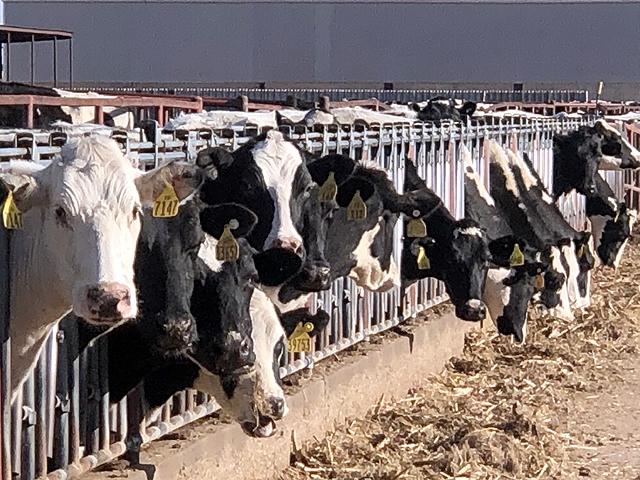US Reaction to USMCA Dairy Ruling
What to Know About the USMCA Dairy Ruling
OMAHA (DTN) -- Following the holiday weekend, lawyers for the U.S. dairy industry, the Biden administration and others are looking at the next possible option following last week's ruling that Canada's tariff rate quota practices do not violate the United States-Mexico-Canada Agreement (USMCA).
The ruling by a dispute-resolution panel was released Friday when most Americans were either post-Thanksgiving shopping or watching college football with their families. Essentially, two members of a three-person panel ruled the way Canada gives out its tariff exemptions -- known as tariff rate quotas (TRQs) -- is in alignment with the trade deal.
The dispute-settlement decision has been roundly criticized by U.S. farm groups and members of Congress.
"U.S. dairy was optimistic USMCA would bring new opportunities, but both sides must play by the rules," said Brody Stapel, president of the Edge Dairy Cooperative in Wisconsin. "We are disappointed by the ruling but do not consider this issue settled. U.S. trade officials must continue finding ways to uphold the commitments Canada -- and all U.S. trade partners -- make under trade agreements."
Stapel said USMCA had promised the opportunity of a 50% boost in export value that has not materialized.
"Unfortunately, processors of high-quality dairy products still cannot find ways to get their product onto Canadian grocery store shelves," Stapel said. "This issue remains a key focus for Edge, and we will continue supporting U.S. trade officials in finding a path forward."
CANADA IS SECOND-LARGEST EXPORT MARKET
Still, Canada remains the second-largest export market for U.S. dairy farmers. Since 2020 when the USMCA was signed, U.S. dairy exports to Canada topped $1 billion in value in 2022. Through the first nine months of 2023, the U.S. exported nearly $818 million in dairy products to Canada, up about 4.8% over the same time in 2022.
While the USMCA set up dispute settlement panels, the trade agreement does not have any language to allow appeals. That's one reason why the Biden administration has brought two cases against Canada over its TRQ policies in the last two years. The first ruling agreed with the U.S. that Canada's system was unfair. The second ruling last week concluded that Canadian officials had solved the problem.
Shawna Morris, executive vice president of trade policy and global affairs at the National Milk Producers Federation (NMPF), said the group's lawyers are still going over the decision.
P[L1] D[0x0] M[300x250] OOP[F] ADUNIT[] T[]
"We think this can't stop here. This result is so poor and it is so clear that Canada is intentionally working to get in the way of the agreement functioning properly," Morris said. She added, "Without an appeal option in the trade agreement, that's just far less clear cut."
2022 RULING ABOUT CANADA
In 2022, a dispute settlement panel ruled Canada was illegally reserving a percentage of dairy TRQs just for Canadian processors.
Canada initially granted nearly all its TQR access to the country's largest dairy processors, effectively granting the decision to import more U.S. dairy products tariff-free over to companies set up to buy and process milk from Canadian dairy farmers.
After the 2022 dispute settlement, the Canadian government essentially moved around the deck chairs by cutting the TRQ earmarks for its domestic dairy processors and opening the door to some food processors and food importers. But U.S. dairy groups said Canada's use of "market share" calculations still leaves the lion's share of TRQs in the hands of Canada's domestic dairy processors.
David Wiens, president of Dairy Farmers of Canada, had a simple statement on the second dispute settlement ruling last week. "We welcome the decision of the panel."
WHAT U.S. DAIRY SELLERS WANT
U.S. dairy sellers have pushed for a more level playing field for "all of the players" among Canada's food and agricultural buyers to have access to those TRQs. The USMCA language states the TRQs should be made available to "food and agricultural establishments" in Canada. The U.S. dairy industry cites that should include Canadian retailers or other food-service providers such as restaurants that buy a high volume of various dairy products.
"They still have a system that excludes retailers," Morris said. "Those are the people cut out of the current system. Those are some of the major entities that we had opened to see included."
Fluid milk prices in Canada are running close to U.S. prices.
A LOOK AT MILK PRICES
Four liters of whole milk in Canada cost on average right now $6.45 CAN, or $4.75 in U.S. currency. A gallon of U.S. whole milk (3.7 liters) now averages $4.34, according to USDA.
Still, the Canadian Federation of Independent Grocers in October called on Canada's Dairy Commission to not raise the farmgate dairy prices next year. Under Canada's supply management system, the Dairy Commission sets farmgate prices. The commission is looking to raise the prices paid to farmers 1.77% starting in February, according to an article in The Canadian Press. The grocers called on the Canadian government to invoke measures to "keep prices stable," pointing to challenges with food inflation.
For U.S. farmers, there is money left on the table because Canadian buyers are not exercising their full TRQ options to buy more U.S. dairy products at zero tariff or lower tariff levels.
"There's a significant gap in the ceiling on that TRQ and where we see exports clocking in at over the past few years under USMCA. That's the opportunity gap we're seeing here," Morris said.
Selling to Canadian dairy processors also typically translates into selling lower-value products compared to selling retail-ready products that would go directly into grocery stories.
"You have an incentive to only bring in products that aren't going to compete with your own products as well," Morris said. "It has an impact not only on the volume but the product mix based on who gets to decide what products and how much."
Also see, "US Loses Latest USMCA Ruling to Canada Over Dairy Market Access,"
Chris Clayton can be reached at Chris.Clayton@dtn.com
Follow him on X, formerly known as Twitter, @ChrisClaytonDTN
(c) Copyright 2023 DTN, LLC. All rights reserved.




